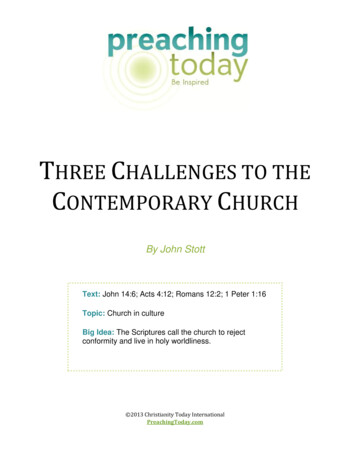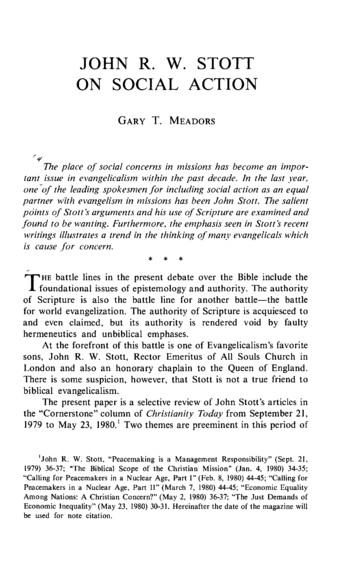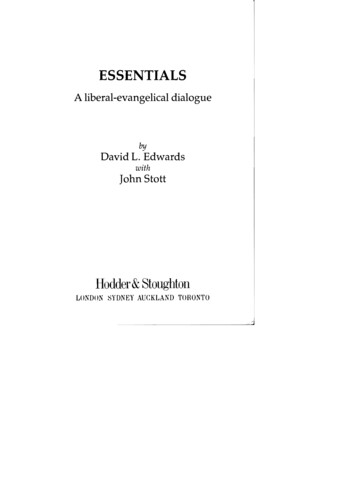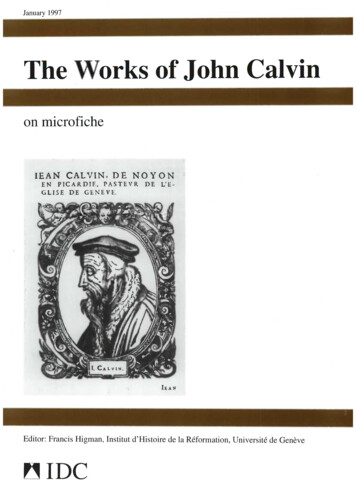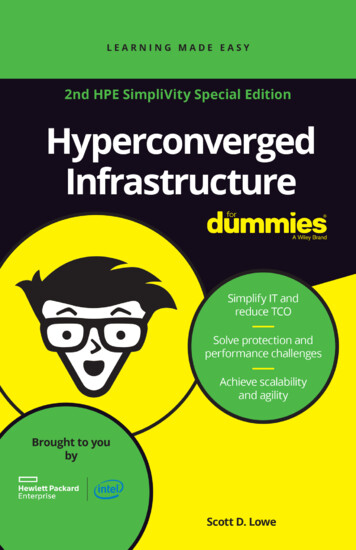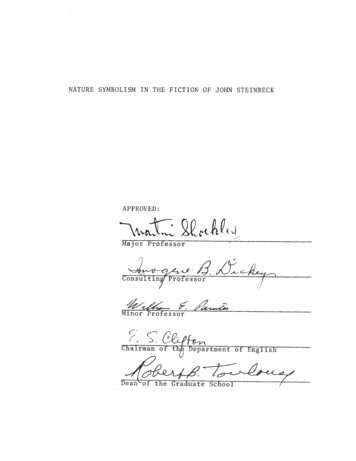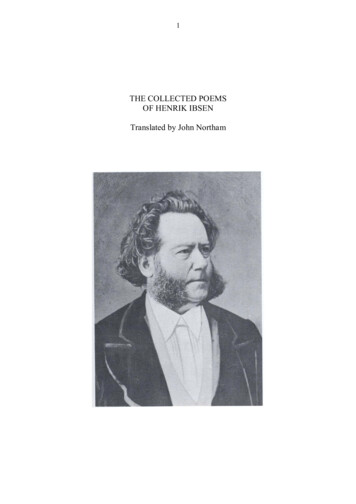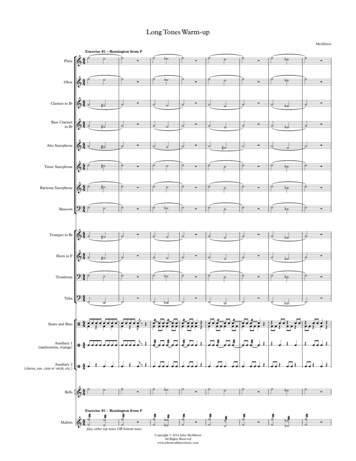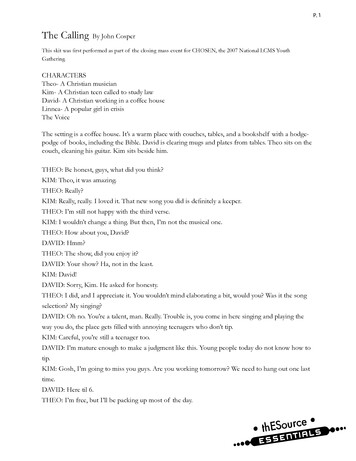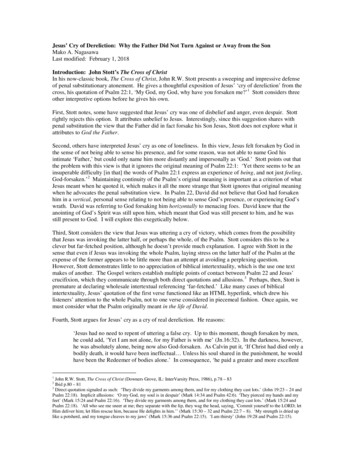
Transcription
Jesus’ Cry of Dereliction: Why the Father Did Not Turn Against or Away from the SonMako A. NagasawaLast modified: February 1, 2018Introduction: John Stott’s The Cross of ChristIn his now-classic book, The Cross of Christ, John R.W. Stott presents a sweeping and impressive defenseof penal substitutionary atonement. He gives a thoughtful exposition of Jesus’ ‘cry of dereliction’ from thecross, his quotation of Psalm 22:1, ‘My God, my God, why have you forsaken me?’1 Stott considers threeother interpretive options before he gives his own.First, Stott notes, some have suggested that Jesus’ cry was one of disbelief and anger, even despair. Stottrightly rejects this option. It attributes unbelief to Jesus. Interestingly, since this suggestion shares withpenal substitution the view that the Father did in fact forsake his Son Jesus, Stott does not explore what itattributes to God the Father.Second, others have interpreted Jesus’ cry as one of loneliness. In this view, Jesus felt forsaken by God inthe sense of not being able to sense his presence, and for some reason, was not able to name God hisintimate ‘Father,’ but could only name him more distantly and impersonally as ‘God.’ Stott points out thatthe problem with this view is that it ignores the original meaning of Psalm 22:1: ‘Yet there seems to be aninsuperable difficulty [in that] the words of Psalm 22:1 express an experience of being, and not just feeling,God-forsaken.’2 Maintaining continuity of the Psalm’s original meaning is important as a criterion of whatJesus meant when he quoted it, which makes it all the more strange that Stott ignores that original meaningwhen he advocates the penal substitution view. In Psalm 22, David did not believe that God had forsakenhim in a vertical, personal sense relating to not being able to sense God’s presence, or experiencing God’swrath. David was referring to God forsaking him horizontally to menacing foes. David knew that theanointing of God’s Spirit was still upon him, which meant that God was still present to him, and he wasstill present to God. I will explore this exegetically below.Third, Stott considers the view that Jesus was uttering a cry of victory, which comes from the possibilitythat Jesus was invoking the latter half, or perhaps the whole, of the Psalm. Stott considers this to be aclever but far-fetched position, although he doesn’t provide much explanation. I agree with Stott in thesense that even if Jesus was invoking the whole Psalm, laying stress on the latter half of the Psalm at theexpense of the former appears to be little more than an attempt at avoiding a perplexing question.However, Stott demonstrates little to no appreciation of biblical intertextuality, which is the use one textmakes of another. The Gospel writers establish multiple points of contact between Psalm 22 and Jesus’crucifixion, which they communicate through both direct quotations and allusions.3 Perhaps, then, Stott ispremature at declaring wholesale intertextual referencing ‘far-fetched.’ Like many cases of biblicalintertextuality, Jesus’ quotation of the first verse functioned like an HTML hyperlink, which drew hislisteners’ attention to the whole Psalm, not to one verse considered in piecemeal fashion. Once again, wemust consider what the Psalm originally meant in the life of David.Fourth, Stott argues for Jesus’ cry as a cry of real dereliction. He reasons:‘Jesus had no need to repent of uttering a false cry. Up to this moment, though forsaken by men,he could add, ‘Yet I am not alone, for my Father is with me’ (Jn.16:32). In the darkness, however,he was absolutely alone, being now also God-forsaken. As Calvin put it, ‘If Christ had died only abodily death, it would have been ineffectual Unless his soul shared in the punishment, he wouldhave been the Redeemer of bodies alone.’ In consequence, ‘he paid a greater and more excellent1John R.W. Stott, The Cross of Christ (Downers Grove, IL: InterVarsity Press, 1986), p.78 – 83Ibid p.80 – 813Direct quotation signaled as such: ‘They divide my garments among them, and for my clothing they cast lots.’ (John 19:23 – 24 andPsalm 22:18). Implicit allusions: ‘O my God, my soul is in despair’ (Mark 14:34 and Psalm 42:6). ‘They pierced my hands and myfeet’ (Mark 15:24 and Psalm 22:16). ‘They divide my garments among them, and for my clothing they cast lots.’ (Mark 15:24 andPsalm 22:18). ‘All who see me sneer at me; they separate with the lip, they wag the head, saying, ‘Commit yourself to the LORD; letHim deliver him; let Him rescue him, because He delights in him.’’ (Mark 15:30 – 32 and Psalm 22:7 – 8). ‘My strength is dried uplike a potsherd, and my tongue cleaves to my jaws’ (Mark 15:36 and Psalm 22:15). ‘I am thirsty’ (John 19:28 and Psalm 22:15).2
price in suffering in his soul the terrible torments of a condemned and forsaken man.’ So then anactual and dreadful separation took place between the Father and the Son; it was due to our sinsand their just reward; and Jesus expressed this horror of great darkness, this God-forsakenness, byquoting the only verse of Scripture which accurately described it, and which he had perfectlyfulfilled, namely, ‘My God, my God, why have you forsaken me?’4Stott’s approach to this passage would affirm that God does abandon and forsake us indeed, through theexperience of Jesus himself. While a few people might take comfort by contemplating Jesus on the cross ascommiserating with us in our experience of divine forsakenness, it is unclear to me why contemplatingsuch a thing brings any comfort at all. Much to the contrary, my treatment of Psalm 22 on the lips of Jesusconfirms that the opposite is true. God does not turn against or away from us in a vertical sense, because‘in him we live and move and have our being’ (Acts 17:28) and ‘in him all things hold together’ (Col.1:17),even though we might struggle with how we feel exposed to hostile forces horizontally. And, since ourlimited perception is actually the problem, the pastoral task is to remind people that God never turns againstor away from us, especially through the experience of Jesus himself. Why, then, did Jesus quote Psalm22:1? What does ‘forsaken me’ mean?As he quotes John Calvin, Stott provides a footnote acknowledging that there are some difficulties withhow Calvin thought.‘It is true, and somewhat strange, that Calvin (following Luther) believed this to be theexplanation of Jesus’ ‘descent into hell’ after his death. What matters most is the fact that heexperienced God-forsakenness for us, however, and not precisely when he did so.’5Unfortunately for Stott, the difficulties with Luther and Calvin’s re-reading of Jesus’ ‘descent into hell’after his death are even more problematic than he lets on – insurmountable, in fact. I will first comment onCalvin’s reading of the tradition of Jesus’ descent to the dead, and then comment on Stott’s reading ofCalvin.Jesus did not descend into hell, since hell proper does not exist yet, and will not exist until Jesus returns toresurrect all the dead (2 Pet.3:7 – 10; Rev.20:7 – 15). Jesus descended into hades, the abode of the souls ofthe dead which corresponds to the Hebrew conception of sheol, the grave.6 This belief answers a basicquestion about the fate of those who died before Jesus came, especially those mentioned – faithful or not –in the Old Testament. From a biblical standpoint, Jesus’ descent is rooted in 1 Peter 3:18 – 20 and 4:6,where Peter discusses the event as a gospel proclamation to those souls,7 and Ephesians 4:9, which saysthat Jesus descended to a place ‘under the earth.’ Moreover, the liturgies and beliefs of the church, whichprecede the composition of 1 Peter and Ephesians, strongly suggest that the church believed in this eventfrom its earliest, apostolic period based on oral tradition handed down from the apostles.8 The phrase ‘hedescended to the dead’ appears in Apostles’ Creed and its precursor creedal statements, found in various4John R.W. Stott, The Cross of Christ (Downers Grove, IL: InterVarsity Press, 1986), p.81Ibid p.816The King James Version’s translation of the Hebrew sheol with the English hell is misleading; conflating the two is incorrect.7I have encountered some who claim Jesus merely mocked the dead (or the angelic powers chained there) without giving them theopportunity for deliverance. But this does a great disservice to Peter’s logic in his letter. Peter parallels the proclamation thathappened among the dead (by Jesus) and the proclamation that happens among the living (by Christians). He makes this parallelbecause he is reminding the suffering Christians that their proclamation must continue. Christ’s suffering led to death, but his deathonly enhanced his ability to preach, this time to a new audience: the dead! Similarly, the Christians’ suffering could lead to theirdeath as well, but if they die virtuously, their death will further advance their proclamation among the living. Christians fearful ofdeath might have argued that their removal from the world of the living would eliminate their testimony, thus making death a potentialweakness in Peter’s argument. Rather, virtuous death strengthens the argument. This is a challenging perspective for the sufferingChristian, but a useful one if we ask God for the courage and strength to live in it! For more, see my paper, Christ’s Proclamation tothe Dead: A Brief Look at 1 Peter 3:19 in Context, found here: df.8I accept the traditional dating of 1 Peter to the 50’s or early 60’s AD, based on the view of authorship as a collaboration betweenPeter and Silvanus (1 Pet.5:12) to explain its more sophisticated Greek. For the purposes of my argument here, skeptical scholars,who date the letter to the reign of Domitian (81 – 96 AD) and the persecution of Christians during this period, simply imply that thebelief in Jesus’ descent to the dead must have spread as part of basic Christian beliefs years, if not decades, before 1 Peter wascomposed. For Peter in his brevity seems to assume that Jesus’ descent to sheol/hades is already common knowledge.5
early church fathers even before Nicaea 325 AD,9 clearly modeled after Jesus’ baptismal, trinitarian creedin Matthew 28:19. This phrase explains why ancient, pre-Reformation churches celebrate the liturgy called‘Holy Saturday,’ also tellingly called ‘Joyous Saturday’ and ‘the Saturday of Light,’ between Good Fridayand Resurrection Sunday, while some Protestant churches are often left wondering what Jesus did onSaturday. This celebration stresses Jesus’ victory over death and the grave by his deliverance of souls fromthere. The Orthodox and Catholic tradition possess innumerable murals and icons of Christ tramplingdown the doors to hades and calling forth souls from the grave. One particularly beautiful mural is inChora Church in Istanbul and is called ‘anastasis’ in Greek, for ‘resurrection.’Luther and Calvin asserted that the meaning of this event should be changed, without any precedent fromexegesis, the history of biblical interpretation, or the church’s liturgical memory. They argued that Jesusdescended to the dead not to awaken and deliver the souls therein, but to be tormented even further byGod’s retributive punishment in the fires of hell. Much more can be said here, but what I have providedabove suffices to call into question Stott’s use of Calvin as an authority on the subject.To get around these problems while trying to maintain that Jesus suffered a retributive punishmentsomewhere and somehow, Stott and others assert that Jesus’ human soul suffered the torments of hell whileon the cross itself.10 But Stott must now work at a double remove from Scripture and church history.Nowhere is this view attested in the Gospels themselves, except for Jesus’ use of Psalm 22:1. The beliefstands or falls on this text alone.Continuing, Stott acknowledges that there are a number of ‘theological objections’ to his position andvarious ‘problems’ associated with it.‘The theological objections and problems we shall come to later, although we already insist thatthe God-forsakenness of Jesus on the cross must be balanced with such an equally biblicalassertion as ‘God was reconciling the world to himself in Christ.’ C.E.B. Cranfield is right toemphasize both the truth that Jesus experienced ‘not merely a felt, but a real, abandonment by hisFather’ and ‘the paradox that, while this God-forsakenness was utterly real, the unity of theBlessed Trinity was even then unbroken.’ At this point, however, it is enough to suggest thatJesus had been meditating on Psalm 22, which describes the cruel persecution of an innocent andgodly man, as he was meditating on other Psalms which he quoted from the cross; that he quotedverse 1 for the same reason that he quoted every other Scripture, namely that he believed he wasfulfilling it; and that his cry was in the form of a question (‘Why ?’), not because he did notknow its answer, but only because the Old Testament text itself (which he was quoting) was inthat form.’11Here Stott admits that the penal substitution theory defies rational consistency concerning the Father-SonSpirit relationship. My stress here is on the word consistency. Was Jesus really abandoned by his Father?9Archbishop Hilarion Alfayev, Christ the Conqueror of Hell (New York, NY: St. Vladimir’s Seminary Press, 2009) lists a formidableamount of literature: (1) non-canonical texts like the Gospel of Nicodemus, the Ascension of Isaiah, the Gospel of Peter, the Shepherdof Hermas, the Teachings of Silvanus, and the Gospel of Bartholomew; (2) liturgical materials which were used in early Christianservices such as the Odes of Solomon and Melito of Sardis’ On Easter; (3) the writings of bishops and theologians including (in the 1st– 2nd century) Polycarp of Smyrna, (in the 2nd century) Clement of Alexandria, Irenaeus of Lyons, Melito of Sardis, (in the 4th century)Athanasius of Alexandria, Basil the Great, Gregory Nazianzen, Greg
4 John R.W. Stott, The Cross of Christ (Downers Grove, IL: InterVarsity Press, 1986), p.81 5 Ibid p.81 6 The King James Version’s translation of the Hebrew sheol with the English hell is misleading; conflating the two is incorrect. 7 I have encountered some who claim Jesus merely mocked the dead (or the angelic powers chained there) without giving them the opportunity for deliverance. But .
